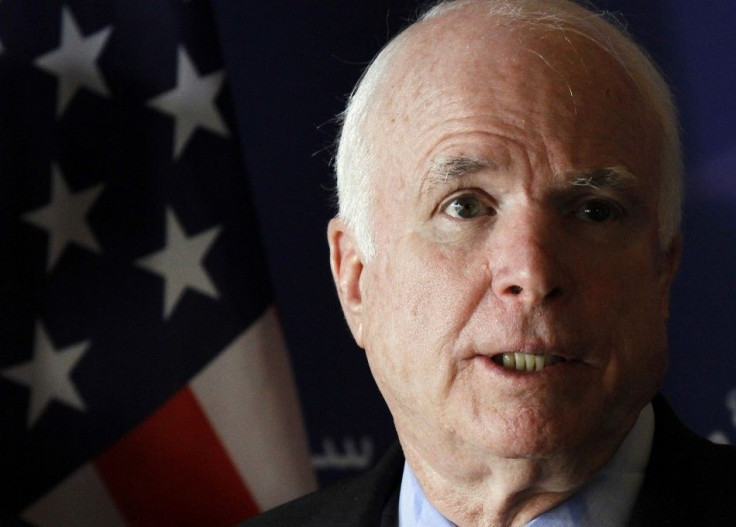John McCain Urges Air Strikes on Syria: Administration Response

On Monday afternoon, Arizona Republican John McCain became the first U.S. Senator to call for air strikes against the Syrian regime of Bashar al-Assad.
[T]he United States should lead an international effort to protect key population centers in Syria, especially in the north, through air strikes on Assad's forces, he said. To be clear: this will require the United States to suppress enemy air defenses in at least part of the country. The ultimate goal of air strikes should be to establish and defend safe havens in Syria, especially in the north, in which opposition forces can organize and plan their political and military activities against Assad.
A resolution against Syria was blocked in the United Nations by vetoes from China and Russia, but McCain urged the U.S. to seek the support of key Arab, EU and NATO partners in staging a military intervention. The full transcript of his comments can be found on McCain's website.
The United Nations has reported that over 7,500 civilians have been killed during the year-long struggle against the al-Assad regime. The Syrian president has refused to step down, blaming the uprising on terrorist gangs and foreign influences while continuing to suppress the revolt. On Thursday, the regime claimed repossession of the Baba Amr neighborhood, an important rebel stronghold in the city of Homs. Journalists and aid organizations have not been allowed into Baba Amr, but fleeing Syrians have reported atrocities including detainment, torture, and the execution of men and boys as young as 12.
To stop the flood of Homs residents fleeing to Lebanon, reports the Syrian Observatory for Human Rights, the Syrian army on Tuesday demolished a bridge over the Orontes River two miles from the Lebanon border.
McCain urged immediate action in response to Syrian rebels' requests for assistance. The opposition Syrian National Council recently announced that it is establishing a military bureau to channel weapons and other assistance to the Free Syrian Army and armed groups inside the country, he said.
Supplying arms to rebels on the ground has been a much contested idea both in the U.S. and internationally. Both Saudi Arabia and Qatar support the notion, but the U.S. has opposed the idea on the grounds that the Syrian National Army is not a unified force; arming them and affiliated groups could lead to a bloody and prolonged civil war, with no guarantee of stability if the rebels succeed. U.S. Secretary of State Hillary Clinton said noncommittally last month that opposition forces will somewhere, somehow, find the means to defend themselves as well as begin offensive measures.
But McCain's recommendations go far beyond simply arming the rebels. Providing military assistance to the Free Syrian Army and other opposition groups is necessary, but at this late hour, that alone will not be sufficient to stop the slaughter and save innocent lives, he argued. The only realistic way to do so is with foreign air power.
McCain acknowledged that the international community has already taken action against al-Assad; Syria has been cut off from the Central Bank and is suffering under heavy trade restrictions and economic sanctions. This has been an impressive international effort, and the administration deserves a lot of credit for helping orchestrate it, he said, before going on to criticize Obama for failing to act more decisively.
McCain's comments did not elicit an overwhelming reaction from the administration. A senior official told ABC that the president and his advisers share [McCain's] concern and outrage about what's taking place [but are] concerned that further military intervention will accelerate the conflict on the ground and worsen the humanitarian situation without stopping the violence the Syrian regime is committing against its own people.
U.S. Defense Secretary Leon Panetta also reportedly rejects McCain's argments. He recognizes that this is an extremely complex crisis, said a senior Pentagon official to CNN. Intervention at this time could very well exacerbate problems inside the country.
© Copyright IBTimes 2024. All rights reserved.












